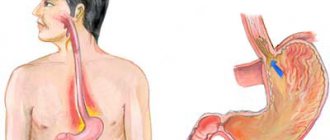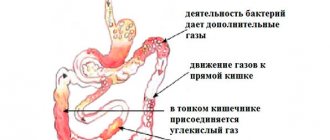Various abnormalities in the functioning of the gastrointestinal tract are accompanied by different combinations of symptoms. Short-term disruptions are most often provoked by errors in nutrition; after a heavy dinner with carbonated drinks, bloating may appear, and due to an addiction to fried foods or sour fruits, you may experience heartburn.
If heartburn and bloating in the abdomen bother you at the same time, you can suspect the development of functional disorders, and this is already serious. In such cases, it is not enough to simply adjust your diet to overcome unpleasant symptoms. It is necessary to establish the true causes of severe bloating and heartburn in order to select an adequate course of therapy.
Emergence
Probably, many of us notice that belching and bloating are observed after heavy holidays, accompanied by eating a large amount of food. Abdominal pain can also occur after eating unusual and difficult to digest foods.
It is necessary to note that the accumulation of gases in the gastrointestinal tract can occur for the following reasons.
Causes of belching:
- Errors in nutrition when a person eats dry food (in this case he cannot avoid flatulence). The same thing happens in the body if you allow significant breaks between meals.
- Poor chewing of food and hasty swallowing rapidly increases gas formation in the stomach.
- Simultaneous consumption of incompatible foods. For example, the appearance of flatulence and heartburn is facilitated by the consumption of salty and sweet foods, dairy products and vegetables at the same time. Diarrhea often develops from these combinations.
- The presence of parasites in the gastrointestinal tract (giardia, trichomonas, etc.).
- Quick conversations (if a person is talking on the phone, he may swallow air). This causes gases to enter the stomach and intestines.
- Eating large amounts of chewing gum. It causes increased gas formation and increased production of gastric juice. The acid formed during these processes corrodes the gastric mucosa, which causes heartburn and nausea.
Important! If you notice that the belching comes with a bad smell, diarrhea, heartburn, lethargy and weakness appear, you should immediately consult a doctor. The same must be done if the above problem appears constantly. This combination of symptoms may indicate human intoxication with helminths.
Useful tips
If you have heartburn and bloating, you should carefully monitor your diet. It is advisable to include in the menu more products that optimize the functioning of the gastrointestinal tract:
- fresh vegetables, fruits;
- cereals;
- dairy products;
- dietary meat.
And completely exclude from daily consumption fatty, too salty and pickled foods, fast food, sweets, hot and spicy dishes. You should also adhere to a certain dietary routine, which involves eating 4 times a day in small portions.
Preventive measures to prevent digestive disorders include a healthy lifestyle, proper nutrition, exercise and giving up bad habits. Timely prevention of viral diseases, strengthening the immune system, and timely medical examinations are very important. And it is very important at the first signs of discomfort (pain, heaviness, bloating, etc.) not to self-medicate, but to consult a doctor for advice and diagnosis.
We recommend reading
August 21, 2015
Heartburn, belching, bloating are symptoms indicating problems in the body’s digestive system. What are the causes of these unpleasant processes, and how to get rid of them?
Mechanism of occurrence
Heartburn is a burning sensation or discomfort in the upper part of the esophagus. Heartburn occurs when acid from the stomach enters the esophagus. Sometimes the cause may be excessively spicy or fatty foods, the abundance of which causes the secretion of a large amount of gastric juice that enters the esophagus. But the regular occurrence of heartburn indicates problems in the functioning of the digestive system.
Belching is the release of gases that accumulate in the stomach or esophagus through the oral cavity. Occurs due to an increase in intragastric pressure - the stomach muscles contract, the sphincter (the valve between the esophagus and the stomach) relaxes, the valve between the duodenum and the stomach contracts. In healthy people, it can occur due to excessive swallowing of air after consuming carbonated drinks, but sometimes accompanies various diseases of the esophagus and/or stomach.
Bloating is one of the symptoms of various types of gastrointestinal diseases, sometimes occurring after a heavy meal or consumption of certain foods. In medicine, this process is called flatulence; it is caused by the accumulation of gases in the intestines. It manifests itself as a feeling of fullness in the abdomen, its increase in volume, rumbling, and may be accompanied by the release of gases (flatulence).
If the listed symptoms accompany you constantly, you need to consult a competent gastroenterologist. You will be prescribed the necessary tests and studies, based on the results of which a diagnosis will be made and treatment will be prescribed. Having recovered from the underlying disease, you will get rid of unpleasant symptoms.
Factors that can trigger the disease
Flatulence can be caused by consuming foods containing large amounts of fiber and carbohydrates: legumes, brown bread, cabbage, milk, grapes, kvass, beer, carbonated drinks, as well as taking antibiotics. In addition, infants, women during pregnancy (accompanied by constipation) and in premenstrual days often suffer from flatulence. Frequent constipation or loose stools (diarrhea), which occur for various reasons, can cause pain and bloating.
Carbonated drinks, onions, milk and dairy drinks, and ice cream can contribute to belching. Belching is observed in young children due to an incompletely formed nervous system. Belching can also occur during pregnancy.
The cause of heartburn in healthy people can be the consumption of certain foods (chocolate, coffee, strong tea, mint, fatty, spicy, sour foods, alcohol), overeating, eating at night, being overweight, smoking, being horizontal after eating, pregnancy .
Diseases that can cause heartburn, bloating, belching
Heartburn can be a symptom of the following pathologies:
- stomach ulcer, duodenal ulcer;
- hiatal hernia;
- chronic gastritis;
- inflammation of the duodenum (duodenitis);
- inflammation of the esophagus;
- cholecystitis - inflammation of the gallbladder;
- obesity;
- gastroesophageal reflux disease (GERD) - disruption of the lower esophageal sphincter;
- complications after operations on the gastrointestinal tract.
Diseases that can cause flatulence:
- impaired intestinal motility;
- chronic pancreatitis;
- irritable bowel syndrome;
- dysbacteriosis;
- lactose intolerance;
- intestinal obstruction;
- tumors;
- polyps;
- complications after operations on the gastrointestinal tract;
- gastritis of various types;
- gallstones;
- enteritis;
- colitis;
- cirrhosis of the liver;
- intestinal parasites;
- intestinal atony due to peritonitis.
Belching can have different characteristics: there is a belching without odor and unpleasant sensations, it is called “air burping.” But it happens that it is accompanied by the release of a small amount of food and an unpleasant aftertaste - bitter, sour, putrid. Different types of belching are symptoms of different diseases. For example, sour belching (occurs as a result of increased acidity in the stomach) can be caused by a stomach ulcer, gastritis, or gastroesophageal reflux.
Bitterness occurs due to the entry of bile from the duodenum into the stomach; it occurs with gastroduodenal reflux, injuries, complications after operations, taking certain medications, chronic duodenitis, hernias, tumors.
Putrid belching, which occurs during stagnation and putrefactive decomposition of food in the stomach, is caused by: diabetes mellitus, chronic atrophic gastritis, ulcers, stomach cancer.
Belching with air occurs due to diseases of the duodenum, aerophagia (excessive involuntary swallowing of air during meals), gastric neurosis, diseases of the gallbladder, liver, cardiovascular system, oral and nasal cavities.
The dangers of ignoring symptoms
Thus, heartburn, belching and bloating, either individually or occurring simultaneously, can be the consequences of various diseases, and ignoring these symptoms (if they occur frequently and occur not only after consuming certain foods or medications) can lead to serious consequences for the body. For example, the cause of belching can be gastroesophageal reflux disease (GERD), which, if left untreated, can lead to diseases such as: esophagitis, peptic ulcer of the esophagus, Barrett's syndrome, esophageal cancer.
If you have contacted a gastroenterologist with complaints of belching, heartburn, or bloating, the doctor may use the following diagnostic methods to find out the reasons that caused these symptoms:
- External examination of the abdomen and whole body.
- Palpation of the abdomen and lymph nodes.
- Tapping the abdominal wall.
- Rectal examination, methods of rectal examination: palpation, endoscopy.
- X-ray of the abdominal organs.
- Gastroscopy.
- Gastroduodenoscopy.
- Ultrasound of the abdominal cavity.
- CT scan (computed tomography) of the abdominal cavity.
- Esophagoscopy with biopsy.
- 24-hour monitoring of intraesophageal acidity.
- Blood, stool, urine tests, BAC culture.
Based on the research results, a diagnosis is made and the necessary treatment is prescribed. With proper therapy, the symptoms that bother you will go away along with the disease that caused them.
Symptom relief methods
Any traditional or non-traditional treatment can be carried out only after consulting a doctor, otherwise you can harm your own body.
The most important condition for getting rid of the above symptoms is nutrition control; it is necessary to limit consumption or avoid foods that provoke heartburn, belching or flatulence, do not overeat at night, do not overeat, eat often, but little by little.
Getting rid of bad habits (alcohol, smoking) and an active lifestyle also play an important role.
Acute attacks of heartburn can be stopped in the following ways:
- Take 1 tbsp. olive or sunflower oil.
- Chew a few peas, almonds, oat grains, barley.
- Eat a sprig of sorrel, dill seeds, and cabbage leaves.
- Drink a glass of warm, non-carbonated mineral water and do not take a horizontal position.
- Drink a glass of potato juice (if there is no reaction to starch).
- Drink 0.5 tsp. aloe juice diluted in 0.5 tbsp. water.
- Have a snack with warm, low-fat, non-spicy food, for example, soup, puree soup, porridge.
- Take an antacid, a medicine to relieve heartburn.
When burping, it is recommended to drink freshly squeezed vegetable juices, eat fresh carrots or apples, and drink goat milk after meals.
For flatulence, you can take activated charcoal (1g/day), drink mint teas or chamomile infusions, add ginger, dill, parsley to your food - these herbs reduce gas formation.
But all of the above are emergency measures. If such symptoms bother you regularly, consult a doctor.
Rate this article:
2 votes, average:
out of 5
Heartburn and bloating are phenomena that in most cases are not given much attention. Almost every person experiences these sensations; they can appear for a while and then disappear without any treatment.
If bloating and heartburn are episodic, there is really no need to worry, this is how the digestive system reacts to deviations from the usual diet or eating pattern.
But when both of these symptoms occur again and again, normalizing the diet does not bring tangible results; the reasons should be sought in the disruption of the functioning of any organ involved in food processing.
Causes of heartburn and bloating
Heartburn and bloating, stomach pain also appear as a result of the following predisposing factors:
- constipation, which causes symptoms of bloating and belching of air;
- insufficient physical activity;
- allergic reactions to certain foods;
- smoking (this often causes stomach pain);
- nervous tension (they can cause increased accumulation of gases in the stomach);
- defects in the structure of the gastrointestinal tract (they make it much more difficult for gases to pass away, which is why bloating occurs);
- frequent disruptions in bowel function;
- liver disease (this causes not only heartburn and bloating, but also belching with an unpleasant smell of rotten eggs).
Interesting! Nausea with bloating with the appearance of dizziness and flatulence
Remember! Frequent belching of rotten eggs indicates that a large amount of hydrogen sulfide is formed in the digestive tract and is an independent disease. Self-medication in this case is strictly prohibited, as this can lead to serious complications.
Causes of bloating
The symptoms of bloating and air belching, the causes and treatment of such phenomena are interrelated. They may indicate the presence of diseases in the human body such as:
- Chronic inflammation of the pancreas.
- Irritable bowel syndrome. In this case, the person is worried about nausea, diarrhea, gas accumulation, and stomach irritation.
- Lactose intolerance.
- Peptic ulcer of the stomach and duodenum. The disease produces foul-smelling gases, leading to belching of air that smells like ammonia or a rotten egg. People around you sometimes notice this.
- A disorder of gallbladder contraction, abnormal increase or decrease in size. These are serious diseases that sometimes have to be treated surgically.
- Chronic inflammation of the walls of the gallbladder.
- Syndrome after gallbladder removal. With this pathology, dull, recurrent pain is almost always observed.
Belching of air, nausea and a feeling of fullness in the abdomen are common during pregnancy. This is not a pathology. However, women at this time need to pay increased attention to their health, because belching and flatulence occur against the background of hormonal imbalance. In general, with bloating and belching of air, the reasons can be different, and a visit to the doctor in such cases is simply mandatory.
Diagnostics
The set of diagnostic measures depends on the symptoms. To make a diagnosis, it is necessary to determine the type of acidity; data from laboratory tests (blood, stool for occult blood, bacterial composition) and instrumental research methods are needed. The first in their series is fibrogastroduodenoscopy FGDS (examination of mucous membranes, and, if necessary, sampling of biomaterial) and colonoscopy, especially if the presence of neoplasms is suspected.
If the data obtained is insufficient, it is possible to prescribe radiography (to determine the shape and size of the hiatal hernia, the presence of which was established by FGDS, the type of deformation of the esophagus), esophagomanometry (to study esophageal peristalsis), if there are symptoms of its obstruction, difficulty swallowing, pain.
Attention! Eosinophilic esophagitis, while very similar to GERD, is characterized by episodic symptoms and causes an increase in the level of leukocytes in the blood with a normal level of acidity.
Symptoms
A person feels discomfort associated with the filling of the stomach with gases. Belching can sometimes be very unpleasant and painful. Added to this are nausea, a burning sensation in the chest, constipation, and loss of appetite. Heartburn occurs when stomach acid begins to irritate the walls of the organ.
Another sign of problems in the digestive system is pain. As a rule, it is dull, although cutting and stabbing pains often appear. Again, soreness may be accompanied by vomiting.
Interesting! Immediately after eating, bloating appeared - the main reasons
What is heartburn?
Heartburn is a symptom of gastroesophageal reflux disease (GERD). When acid from the stomach enters the esophagus, it can cause burning pain in the chest. Symptoms of heartburn are varied:
- burning in the chest;
- a burning sensation that may constrict the throat;
- a feeling of tightness in the throat and chest;
- sharp chest pain.
For some people, heartburn may present as chest pain. For others, it may be a sore or burning throat. Heartburn often occurs after eating. A person may experience heartburn if they lie down or bend over shortly after eating. Some common heartburn triggers include:
- eating heavy fatty foods;
- spicy food;
- alcohol;
- acidic foods such as tomatoes.
Risk factors that increase the likelihood of heartburn:
Medicines that may increase the risk of heartburn:
- some antihypertensive drugs;
- antihistamines;
- certain drugs to treat asthma.
Diet
When belching and gas occur, nutritional correction is necessary. The following foods will have to be excluded from the diet:
- all legumes - they cause bloating and belching;
- heartburn and flatulence are caused by canned food and pickles;
- herring;
- seafood;
- fat meat;
- any cabbage;
- sweets;
- radishes, turnips, radishes, onions.
In case of belching and gas formation, it is necessary to add low-fat meat dishes from rabbit, veal, and chicken to the menu. It is useful to drink homemade yogurt and yogurt. It is recommended to add special spices to dishes to reduce gas formation and normalize stomach function: coriander, parsley, dill.
Experts recommend preparing dill water: this medicine normalizes the condition of the intestines and stomach, relieves pain and rumbling in the stomach.
Risk group
At risk are children whose bodies are still developing, as well as expectant mothers who are forced to face all the hardships of pregnancy.
Burning and bloating in children
If a child complains of burning pain and abdominal distension, then active physical games should be excluded immediately after eating. The functioning of the gastrointestinal tract should be normalized even after giving up fried and fatty foods. It is recommended to introduce more fermented milk products (except milk), vegetables and fruits.
It is important to study the child’s individual reaction to certain foods in order to exclude the factor of food allergy. When the body rejects certain components, belching is also present in children and adolescents.
Possible causes of heartburn in infants
In newborns, unpleasant symptoms often develop due to individual intolerance to mixtures or improper introduction of previously unfamiliar products. Possible diseases associated with unpleasant conditions include: cystic fibrosis, scoliosis, ENT diseases, helminthic infestations. Persistent heartburn and flatulence, even after following all the recommendations, should be accompanied by a visit to your doctor.
Discomfort in pregnant women
The occurrence of toxicosis disrupts the proper functioning of the gastrointestinal tract, and the appearance of stress on the stomach from an enlarged child only increases the discomfort. Due to physiological transformations, a burning sensation occurs: the esophageal sphincter temporarily loses its locking function. However, after childbirth, the hormonal balance is restored and the discomfort goes away.
Features of treatment
Treatment of belching and bloating begins after a thorough diagnosis. The goal of all therapeutic measures is to select drugs that reduce gas production. As a rule, when taken accurately, belching and bloating go away. Correction of nutrition is of great importance: sometimes this must be done throughout life.
For complex therapy, the following medications are indicated:
- Activated carbon;
- Polysorb;
- Polypephane;
- antacids;
- white clay tablets.
Surgery is recommended in very rare cases. Sometimes doctors need to expand the intestinal lumen.
Prevention
Belching, diarrhea, and bloating are easy to prevent. To do this, you should listen to some advice.
- It is advisable to spend more time in the fresh air. It is especially useful to walk near green areas and parks.
- It is necessary to monitor your daily routine: get enough sleep, go to bed early.
- You should never eat low-quality or expired food. It often causes bloating and diarrhea.
- To combat physical inactivity, you need to do morning exercises and simple sports.
So, flatulence and belching are frequently occurring symptoms that require adequate attention and treatment. As you can see, in the absence of therapy, a person can develop dangerous complications. It is not difficult to prevent the development of belching and bloating: it is enough to follow proper nutrition and the principles of a healthy lifestyle.









